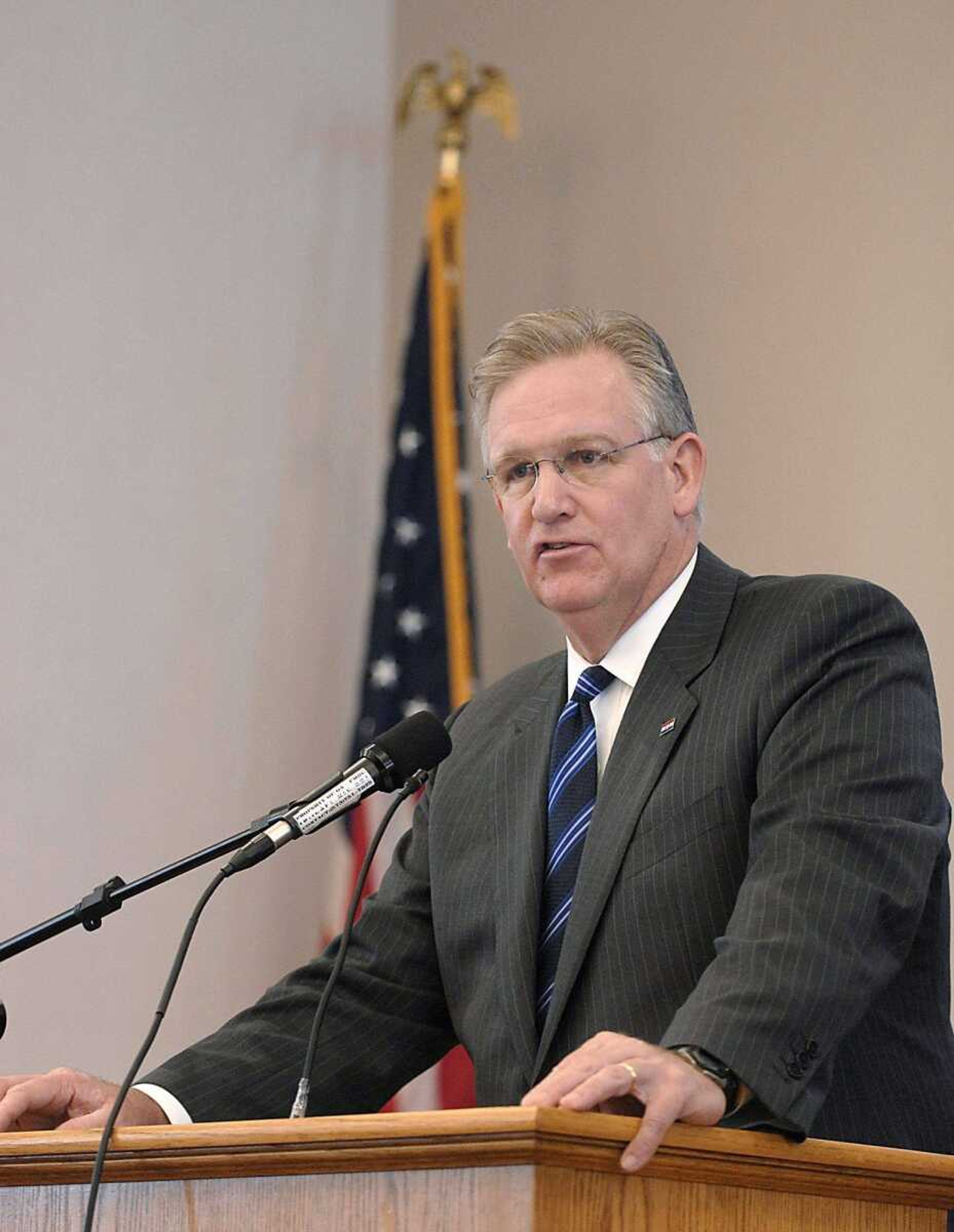Nixon cuts $126M in spending, proposes more
JEFFERSON CITY, Mo. -- Missouri Gov. Jay Nixon cut nearly $126 million in spending Thursday and proposed to dig even deeper by eliminating 1,000 state jobs, half the state's primary vehicle fleet and all state scholarships for students at private colleges...
JEFFERSON CITY, Mo. -- Missouri Gov. Jay Nixon cut nearly $126 million in spending Thursday and proposed to dig even deeper by eliminating 1,000 state jobs, half the state's primary vehicle fleet and all state scholarships for students at private colleges.
Nixon's blueprint for reshaping government also would ax several state holidays, cut back on employee pension and health benefits, privatize child support collections, curtail state tax credits and merge various government agencies.
"We are going to do fewer things," Nixon said in prepared remarks at an annual meeting of the Springfield Business Development Corp. "But we are going to them more efficiently, and more effectively, and with greater accountability to taxpayers."
Missouri's government faces immediate and future financial concerns.
Nixon has vetoed or cut more than $850 million from this year's $23.7 billion budget for state operations and capital improvements. The $126 million of reductions announced Thursday include:
* The elimination of in-home care services, such as bathing and cleaning, effective April 1 for 2,600 lower-income elderly or disabled people.
* Reduced state aid for public school buses and community health care clinics.
* A $1.1 million cut in state subsidies to Amtrak, which recently has increased its ridership on Missouri's twice daily trains between St. Louis and Kansas City. The cut would force the elimination of one of those trains, unless the Missouri Department of Transportation comes up with money from elsewhere or negotiates with Amtrak to accept less.
Budget director Linda Luebbering also said Thursday that Missouri plans to borrow from a $200 million pool of federal stimulus funds to avoid a delay in paying state income tax returns.
Luebbering also said the state's 2010 revenue projection has been revised downward for the second time in three months. The state now expects to end the fiscal year on June 30 with a 9.6 percent revenue decline from the previous year.
The state's future problems are perhaps more daunting.
Nixon said he expected a $500 million shortfall in the 2011 budget that he outlined just two months ago. The governor and legislators have warned that 2012 could be even more difficult.
Nixon and Republican legislative leaders have ruled out tax increases to help close the gap.
The suggestions Nixon outlined Thursday are just a starting point. "We know there's going to have to be more," Luebbering said.
Nixon can implement some steps -- such as employee layoffs, the sale of state vehicles and buildings, and the consolidation of state laboratories -- by his own initiative.
Other proposals will require legislative approval, including reductions in biofuel subsidies, the elimination of holidays for state workers, the merger of the state highway and water patrols and the consolidation of the Department of Higher Education with the Department of Elementary and Secondary Education.
Nixon also is proposing to "fold up the sprawling bureaucracy" of the Family Support Division, by closing some of the county welfare offices in favor of regional centers.
Legislative reaction was mixed about the merger proposals.
House Budget Committee Chairman Allen Icet, R-Wildwood, and Senate Appropriations Committee Chairman Rob Mayer, R-Dexter, both said they made sense. Senate President Pro Tem Charlie Shields, R-St. Joseph, said combining the education departments could prove advantageous, but that he was sure such a move would raise concerns.
Nixon's proposal to end financial aid for students at private colleges and universities could prove even more problematic in the Legislature.
Last school year, Missouri awarded more than $50 million in scholarships to nearly 15,000 students at 58 private universities, colleges and technical schools, according to statistics from the Department of Higher Education.
Icet said the thought of cutting those scholarships gives him heartburn and seems unfair. Mayer also expressed opposition.
"Missouri has a very big private college sector," Shields added. "I would suggest that's going to be hard to do."
Missouri's financial woes are not unique. States across the nation are struggling with declining revenue and growing budget holes. States have increased taxes and cut spending in 2010 to close $90 billion in budget gaps with another $19 billion still remaining, according to February report by the National Governors Association and the National Association of State Budget Officers. Nineteen states this year have cut up to 5 percent of their budgets and 24 have trimmed even deeper.
The collective financial situation for states is not expected to improve much over the next several years. States are facing $55 billion in budget holes in 2011 and $62 billion in 2012, according to the February report.
------
Associated Press Writer Chris Blank contributed to this report.
Connect with the Southeast Missourian Newsroom:
For corrections to this story or other insights for the editor, click here. To submit a letter to the editor, click here. To learn about the Southeast Missourian’s AI Policy, click here.









